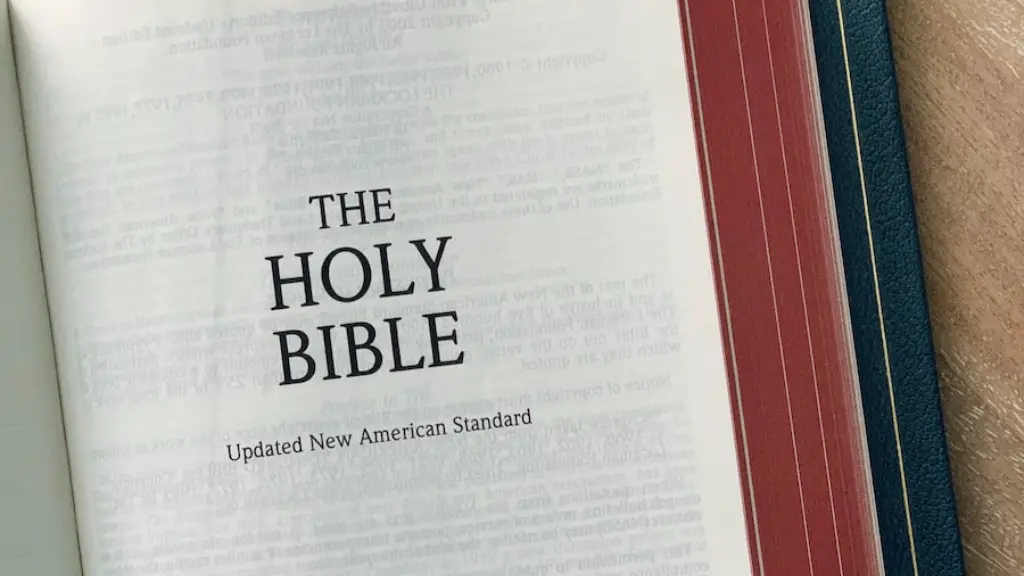The Law of Moses is an important part of the Bible and is essential to understanding the teachings of Jesus and the Covenant between God and His people. In this article, we will discuss what it is, how it is structured and why it is significant.
The Law of Moses is the system of religious regulations and laws given to the children of Israel, through Moses, by God. It is also referred to as the Mosaic Law or the Hebrew Law. This collection of laws was meant to guide Israel from being a tribal society to a nation. The primary purpose of the Mosaic law was to provide a set of instructions for the Israeli people and their relationship with God. It is the first recorded book of religious law and is the foundation for many of the other laws found in the Bible.
The Law of Moses is structured in several books and consists of three main parts – the Ten Commandments, civil (or royal) laws and religious laws. The Ten Commandments is the most well-known part of the Law of Moses as it contains the moral code of law. It is divided into two sections – precepts (laws conveying moral commitments) and promises (laws offering blessings). Civil laws are practical and authoritative laws regulating government and covers topics such as military service and debt. The third and final part of the Law of Moses is religious laws which focus on the worship of God, establishing the Temple and the Priests and the sacrificial system.
The significance of the Law of Moses can be seen in the life and teachings of Jesus. Jesus followed the Law faithfully and taught many of its Principles. He offered a more fulfilling interpretation of the Law, honoring commands to “Love God” and implied and even more clearly expressed that loving one’s neighbor is just as important. Jesus believed that the heart of the Law was to love one’s God and one’s neighbor, and he summarized his teachings with the Great Commandment. The Law of Moses was a way of life, setting forth standards of morality, possible punishments and ultimately, redemption.
In addition, experts believe that the Law of Moses serves as an example of God’s righteous judgment and His commitment to do what is right. According to their understanding, the Law of Moses is not only to preserve the community of Israel, but an expression of mercy and justice for all humanity. Furthermore, it is believed to have an everlasting applicability, sharing some common ground with other religions, such as Christianity, despite being uniquely Jewish.
The Law of Moses is a major part of the Bible, and an integral part of the teachings of Jesus. It is highly meaningful and offers a deep set of instructions and values that can still be observed and live by in the present day.
Purpose Of The Mosaic Law
The Law of Moses or Mosaic Law was given by God to the people of Israel during their exodus from Egypt. It is a series of laws and regulations that were meant to provide guidance to the Israelites as they moved from tribal society to nationhood. It is the oldest code of religious law in the world and provided clear guidance in terms of ethics and morality. Scholars suggest that it assisted the Israelites in getting organized, defining marriage, and establishing guidelines for social interaction, among other things. It also served to separate the Israelites from the surrounding nations and was used to preserve the culture and religious practice of the Israelites in the Land of Israel.
The purpose of the Mosaic law was multifaceted. On one hand, it provided a way for the Israelites to remain culturally distinct from the nations around them. On the other hand, it was also meant to serve as a source of guidance for social order, justice and morality. Moreover, it serves as an example of the righteousness and holiness of God, and it provides instruction for living out our faith and relationship with God.
Structure Of The Mosaic Law
The Law of Moses is divided into 3 parts which each contribute to a unique and vital aspect of the Law. Firstly, there are the Ten Commandments, a set of moral and ethical guidelines that provide instruction on how to live in relation to God and other people. It includes 2 precepts (laws conveying moral commitments) and 8 promises (laws offering blessings). This is the most famous and well-known part of the Law of Moses.
The second part is civil laws. These are authoritative laws governing the actions of government and the individual, focusing on topics such as military conscription, debts and inheritance. These laws provided practical guidance for social order and justice. Lastly, there are religious laws which focus on the Israelites relationship with God including instruction on worship, establishing the Temple and Priesthood and the sacrificial system in place.
The Significance Of The Mosaic Law
The significance of the Mosaic Law is seen most clearly in the teachings of Jesus. He followed the Law faithfully and taught many of its Principals. Jesus firmly believed that the heart of the Mosaic Law was to love one’s God and one’s neighbor and this is reflected in his teachings and his summary of the Greatest Commandment. In addition, by studying and following the Law of Moses, we can gain a better understanding of God’s justice, holiness and mercy. It also serves as a source of moral and ethical guidance in our modern society and has an everlasting applicability.
Furthermore, scholars suggest that The Law of Moses serves to demonstrate God’s commitment to what is right and just, as well as to His people. By studying and following the teachings of the Law of Moses, we honour God and demonstrate our commitment to Him and His people. In addition, the Law of Moses is seen as a source of hope for those who follow it, with the promise of redemption if one follows its instructions.
Sources Of The Mosaic Law
The Law of Moses is believed to have originated from multiple sources. It is possible that many of its laws stem from the Ancient Near Eastern culture, with similarities to ancient Egyptian and Babylonian laws. Scholars believe that they were changed, reinterpreted and codified by Moses and the other prophets, who were instrumental in delivering the law to the people of Israel. Furthermore, aspects of the Law of Moses can also be seen in other religious and ethical systems, such as the Code of Hammurabi and the Torah, hinting that parts have been borrowed from other sources.
In conclusion, the Law of Moses is an essential part of the Bible, and of the teachings of Jesus.It is the foundation for many of the other laws in the Bible and offers a system of morals, ethics and religious principals to follow. Furthermore, by studying and understanding the Law of Moses, we can gain a better insight into God, His righteousness and justice, His relationship with His people, as well as how to live a fulfilling and meaningful life.
The Influence Of The Mosaic Law On The Islamic Religion
The Mosaic Law or the Law of Moses is an important part of the Bible and is essential to understanding the teachings of Jesus and other major religions such as Islam. It is believed that there are many similarities between the Mosaic Law and the teachings of the Quran, making it possible to draw parallels between them. For instance, both religions believe in the same God, have similar ethical and moral codes of conduct and emphasize the importance of performing good deeds. Furthermore, both religions require their followers to be religious and to submit to God’s will.
It is believed that many of the teachings found in the Quran have been heavily influenced by the Law of Moses. This is particularly true when it comes to topics related to worship, prohibitions, ethical behaviour and justice. For example, the prohibition against stealing found in Islamic Law is similar to the 8thCommandment in the Ten Commandments which prohibits stealing.
In addition, many of the major prophets mentioned in Islam are also mentioned in the Law of Moses. This includes figures such as Moses, Noah, Abraham and David. It is believed that each of these prophets taught the same essential truths, giving further evidence to the influence of the Law of Moses on Islam.
Conclusion
The influence of the Law of Moses cannot be underestimated. It is an essential part of the Bible and the teachings of Jesus which offers a system of morals, ethics and religious principals to follow. Furthermore, it can be seen in other religious systems, notably Islam, providing an insight into the unwavering commitment of God to His people and His justice and mercy.




